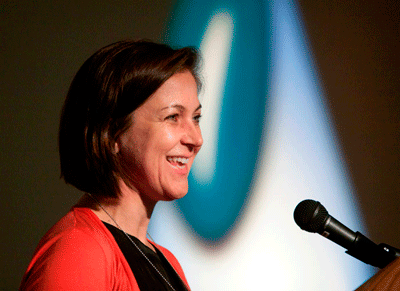- ON THE DECADE
- THE DECADE'S CAMPAIGN
- REPORTING ON PROGRESS
- THE DECADE'S PROGRAMMES
- FOCUS AREAS
-
- Access to sanitation
- Financing water
- Gender and water
- Human right to water
- Integrated Water Resources Management
- Transboundary waters
- Water and cities
- Water and energy
- Water and food security
- Water and sustainable development
- Water and the green economy
- Water cooperation
- Water quality
- Water scarcity
- FOCUS REGIONS
- RESOURCES FOR
- UN e-RESOURCES
International UN-Water Conference. Water in the Green Economy in Practice: Towards Rio+20. 3-5 October 2011
The Green Economy and... Julia Bucknall
 "For me, the green economy means thinking hard about making sure that the actions of today will not lock us into problems tomorrow. Also, it means thinking hard about ways in which we can meet the needs of the poor and the needs of poor countries."
"For me, the green economy means thinking hard about making sure that the actions of today will not lock us into problems tomorrow. Also, it means thinking hard about ways in which we can meet the needs of the poor and the needs of poor countries."
Julia Bucknall
Manager of the World Bank's central unit for Water
Julia Bucknall is the Manager of the World Bank's central unit for Water, known as the Water Anchor. She has also worked as a Lead Natural Resources Specialist for the World Bank's Middle East and North Africa region.
What are your expectations on the conference in Zaragoza?
Zaragoza has shown major leadership in water, so I hope that in the Rio+20 process, the Zaragoza conference will highlight the important role of water as an enabler of green growth.
Why is 'water in the green economy' an important theme for the World Bank?
For us, "green growth for all" is a very important driver of everything we do. The "for all" part of the concept is extremely important, because it represents an equity issue. Our objective is to prioritize interventions that promote environmental sustainability and that promote a growth path that will not lock countries into consumption patterns that will be environmentally problematic in the future.
Water is critical in the green economy, because is cutting through all sectors. It is increasingly recognized that water is not a sectoral issue, but a core development issue. We believe that no country will be able to meet its energy security, its urban safety and food security objectives without doing a better job on managing water.
Which change is essential to bring about in order to achieve a truly green economy?
In my personal view, countries need to measure accurately how much water they have, publish that information, allocate the water across different uses and enforce the limits of those uses. That is a very difficult technical and political challenge, but if you don't do that, you can't make sensible decisions about investments, infrastructure, agricultural policy or urban planning. This is not a sexy or attractive change, but it is one of those building blocks that I consider to be essential for the green economy.
Why is this not happening yet?
For a number of reasons. First of all, it is technically difficult; terminologies vary from place to place and from sector to sector. Secondly, it is hard to make the hydrological information understandable and have an informed public debate. Finally, it is very politically tricky because you will have to raise the price of water in some areas and stop people from using too much water. In this respect, countries like Australia have a lot to teach us. Australia reached a crisis point and had to tackle these issues. It can form an example for other countries that are about to reach crisis levels as well. In the end, people have to see that the benefits are greater than the pain.
Which other barriers inhibit the process of change towards a green economy?
The barriers are often political. A clear consensus on the way forward is often lacking. The choices that need to be made are painful for some people in the short term, but beneficial for a large number of people in the long term. That makes it politically tricky. Furthermore, there are also technical barriers. In the end, hydrology is very complex. While one unit of carbon dioxide emissions is exactly the same wherever you emit it and has exactly the same impact, with water this is not the case. Wasting a liter of water in wet places such as Indonesia is not the same as wasting a liter of water in dry places such as Israel or Burkina Faso. This makes it quite hard to explain to people.
The World Bank session focuses on innovative cost-recovery and sustainable financing. How can these tools contribute to overcoming the barriers that inhibit progress towards a green economy?
Providing reliable services to people is an essential part of the green economy. Our experience is that the best way of providing good services to customers is to treat them like paying customers. You can provide subsidies to poor households, but if you let people pay for the services from the water services provider, they are more likely to receive good services. Charging for water is politically complicated, but our experience is that it is very difficult to do a good job of providing services if you don't treat your customers as customers.
As regards other sustainable financing issues; we see the potential of stimulating sustainable behavior through some of the new financing instruments. For example, a lot of the climate change adaptation work and climate mitigation funds have an important impact on improving water management.
How can we make sure that the transition towards a green economy is "inclusive"; contributing to poverty alleviation instead of aggravating inequalities?
The simplest way is by making sure that you talk to poor people and think about poor people in everything that you do. You need to be clear that your actions are promoting growth and reducing poverty in the long run. So you should think about the logical chain on how to get from your interaction to your overall objective, which is reducing poverty. On the other hand, interactions that are not specifically targeted at poverty reduction can also have a major impact on improving the lives of the poor people. For example, who would have thought that building a mobile phone network in Africa twenty years ago would have a major impact on the lives of the poor people?
In my view, the transition towards a green economy will not aggravate inequalities between developed and developing countries. I think looking at long-term sustainability is in the long-term interest for the poor. It is usually the poor that suffer most from environmental failures, such as floods and droughts. They are least able to protect themselves from these kinds of problems. When groundwater gets depleted, poor people who can't afford a deeper well have to sell their land for a low price to rich people who can afford to build a deeper well.
What message would you like to deliver for the UN Conference on Sustainable Development (Rio+20) in June 2012?
My message would be that countries will not be able to meet their urban security, food security, energy security and poverty reduction goals without massively improving the way in which they manage their water resources and services.
>> Conference Home
>> Statements from UN Agencies
>> Video recording of sessions

>> Ch1 Water on the Road to Rio+20
>> Ch2 Challenges and opportunities for water in the transition to a GE
>> Ch3 Thematic conference papers
>> Ch4 Conference summary: Water in the GE in practice
>> Ch5 The way forward
>> A1 Water toolbox: A contribution to Rio+20
>> A2 Feedback report
>> A3 Communications report
>> Case papers by tool
>> By region 
>> Developing countries 
>> Developed countries 
>> Agenda 
>> Economic instruments
>> Green jobs
>> Sustainable financing
>> Investments for biodiversity protection
>> Water technology
>> Water planning
>> ESCWA region
>> LAC region
>> Conference daily
>> Interviews with case presenters 
>> Presentations
>> Communications articles
>> Conference media brief 
>> Daily press notes
>> Interviews with session conveners
>> Issues information briefs
>> Tools information briefs
>> Banners
>> Reader on water and the Green Economy 
>> Conference poster 
 >> Discussion forum
>> Discussion forum
 >> Twitter
>> Twitter
>> Water, energy and food security
>> Spanish Business Dialogue
>> Stakeholder dialogue on the Green Economy in Spain
>> Technical visit
>> Organizers
>> Participants
>> Conference committee
>> Rationale
>> Tools
>> Expected outcomes
>> 2nd UNCSD PrepCom
>> Road map to Rio+20
>> Key questions on GE
Copyright | Terms of use | Privacy notice | Site Index | Fraud alert | Help





